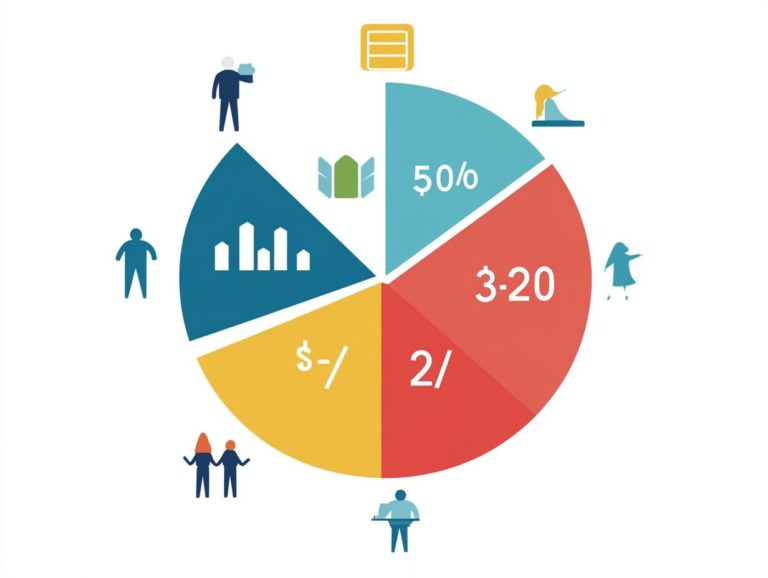How Do I Create a Budget for My Business?
A well-crafted budget is the powerhouse of your business! It serves as a roadmap for financial health and growth.
Understanding the importance of a budget is crucial; it lays the groundwork for assessing your financial situation, reviewing income and expenses, and establishing clear financial goals.
Get ready! This guide will walk you through the process of creating a robust budget plan, from development to effective implementation.
With practical tips for monitoring and adjusting your budget, you ll be fully equipped to navigate your business s financial landscape with confidence.
Contents
- Key Takeaways:
- Understanding the Importance of a Business Budget
- Assessing Your Business’s Financial Situation
- Creating a Budget Plan
- Implementing and Monitoring the Budget
- Frequently Asked Questions
- What is a budget and why is it important for my business?
- How do I create a budget for my business?
- What are the key components of a business budget?
- How often should I update my business budget?
- Can I create a budget for my business without prior financial knowledge?
- What are some common budgeting mistakes to avoid for my business?
Key Takeaways:

- A budget is essential for any business to track and control its finances, set financial goals, and make informed decisions.
- Start by reviewing your business’s income and expenses, identifying financial goals, and developing a budget plan by setting realistic targets. Regularly monitor and adjust it.
- To stick to your budget, prioritize expenses, look for cost-cutting opportunities, and regularly track and adjust the budget as needed to stay on track towards your financial goals.
Understanding the Importance of a Business Budget
A good understanding of the importance of a business budget is crucial for you as a business owner aiming for financial peace and stability. Whether you run a small business or a startup, knowing how to create a budget for your side hustle can help you effectively forecast your finances, monitor expenses—be they regular, changing, or one-time—while also ensuring that your revenue streams are fully optimized.
Prioritize a solid budgeting process to maintain strong cash flow, enhance your profit margins, and ultimately realize your financial aspirations.
Why Every Business Needs a Budget
Every business requires a well-defined budget to strategically allocate resources, monitor cash flow, and create a realistic budget to forecast profits.
A thoughtfully crafted budget acts as your financial roadmap, enabling you to make informed decisions that can profoundly impact your growth trajectory. For example, by accurately estimating fixed costs such as rent and salaries, make sure you set aside enough funds to cover these essentials without stretching your resources too thin.
Conversely, budgeting for variable costs like inventory or marketing expenses offers you the flexibility to respond dynamically to shifting market conditions. This kind of wise spending not only enhances your financial health but also provides you with the insights necessary to prioritize investments and optimize operations, ultimately paving the way for more sustainable success.
Assessing Your Business’s Financial Situation
Assessing your business s financial situation is an essential step in the budgeting process. This involves a thorough review of your financial data, including income and expenses, to clearly understand your current cash flow and profitability.
This comprehensive evaluation allows you to make informed decisions that will guide your financial strategies moving forward.
Reviewing Income and Expenses

Reviewing your income and expenses is vital for grasping the financial health of your business and pinpointing areas ripe for improvement.
By meticulously categorizing your various income streams and breaking down expenses into specific categories like the cost of products you sell, the costs to keep your business running, and the costs for office management and support, you can uncover invaluable insights into how your budget is allocated. For those starting a new job, understanding how to create a budget can be especially beneficial. Tracking these financial elements accurately not only reveals your spending patterns but also highlights opportunities for cost reduction. This strategic approach enables you to make informed decisions, ensuring financial stability while setting the stage for future growth.
Understanding these dynamics is crucial for achieving sustained profitability and establishing realistic financial goals.
Identifying Financial Goals
Identifying your financial goals is crucial to budgeting. It lays the groundwork for your future financial plans.
These goals include profit expectations and growth targets that guide you in how you spend your money. Establishing clear objectives channels your efforts towards achieving specific outcomes and enhances your strategic planning and financial forecasting, which means predicting future financial outcomes.
Break down these goals into measurable milestones. This creates actionable steps for spending, investment, and savings. This clarity keeps all stakeholders aligned and enables you to adapt strategies as the financial landscape shifts, ultimately fostering good financial health.
Creating a Budget Plan
Use a budget template to organize your financial data clearly. This approach enables you to categorize your expenses and project your revenues effectively. To learn more about budgeting for specific events, consider checking out how to create a budget for a wedding to account for startup costs with precision and clarity.
Steps for Developing a Budget
Developing a budget is a refined process that involves methodical steps, ensuring both accuracy and effectiveness in managing your financial resources.
To embark on the path to financial stability, begin by evaluating all your income sources and expenses. This assessment provides a crystal-clear picture of your cash flow. By employing budgeting tools whether they be spreadsheets or dedicated software you can categorize your spending and establish realistic spending limits.
It s essential to create a budget summary, which serves as an invaluable resource for tracking your progress over time. This summary not only highlights areas where adjustments might be needed but also reinforces your commitment to financial goals, fostering a disciplined approach to managing your cash flow.
Implementing and Monitoring the Budget

Implementing and monitoring your budget is essential for maintaining financial health. It ensures that your business stays aligned with its financial plan while allowing for continuous evaluation of operational efficiency.
This proactive approach safeguards your resources and helps you make informed decisions for success.
Tips for Sticking to the Budget
Sticking to your budget takes discipline! Adopt smart cost-cutting measures and diligently track your expenses.
- Prioritize regular reviews of your spending habits.
- Set specific, attainable objectives to stay focused and motivated.
- Utilize budgeting tools or apps to streamline the monitoring process.
- Open a dedicated savings account for emergencies. This way, you won t dip into your budget for unexpected costs.
By following these actionable strategies, you can cultivate the self-discipline needed to maintain a solid financial footing and achieve long-term financial stability.
Tracking and Adjusting the Budget as Needed
Tracking and adjusting your budget as needed is a dynamic process that ensures you stay aligned with your financial goals while effectively managing cash flow challenges.
By regularly reviewing your operating expenses, you can spot areas where cutting costs or reallocating funds is necessary. This flexibility in your financial planning enables you to respond swiftly to market changes and unexpected expenses, helping you maintain a robust financial posture.
Leaning on real-time financial data allows you to detect trends and variances that might otherwise fly under the radar. Ultimately, your ability to adjust budgets promptly fosters a proactive approach to financial management, enabling you to remain competitive and resilient in an ever-evolving landscape.
Frequently Asked Questions
What is a budget and why is it important for my business?

A budget is a financial plan that outlines your expected income and expenses for a specific period of time.
A budget helps you allocate resources effectively. It also tracks your financial progress and aids in making informed decisions.
How do I create a budget for my business?
To create a budget for your business, first estimate your income and expenses, considering both fixed and variable costs. If you’re unsure about the process, check out this guide on how do I start creating a budget? for more tips.
Then, prioritize your expenses and allocate a budget for each category. You should also constantly monitor and review your budget for necessary adjustments.
What are the key components of a business budget?
The key components of a business budget include projected income, fixed expenses, variable expenses, long-term investments in equipment or property, and what are the basics of creating a personal budget? and cash flow.
These components provide a comprehensive overview of your business’s financial health and help you make informed decisions.
How often should I update my business budget?
Review your budget every month or quarter. This keeps your business on the right track and helps you achieve your goals!
Can I create a budget for my business without prior financial knowledge?
While basic financial knowledge is beneficial, you can still create a budget by using online budgeting tools and resources.
You can also seek help from a financial advisor or accountant to guide you through the budgeting process.
What are some common budgeting mistakes to avoid for my business?
Some common budgeting mistakes to avoid include underestimating expenses and not accounting for unexpected costs.
Additionally, not regularly reviewing and updating your budget and failing to set realistic financial goals can lead to problems.
Planning and budgeting carefully helps you avoid these common mistakes and ensures the financial success of your business.






